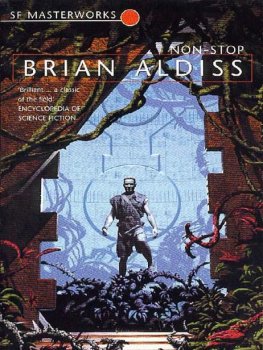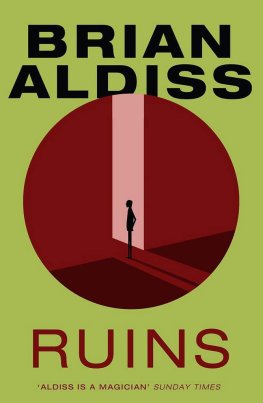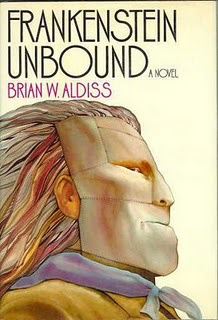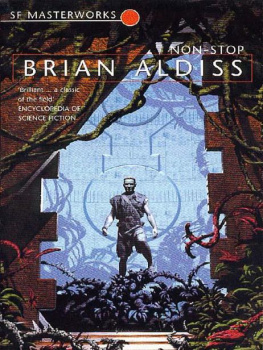
Super-Toys Last All Summer Long
By Brian Aldiss
The short story that started it all.
In Mrs. Swintons garden, it was always summer. The lovely almond trees stood about it in perpetual leaf. Monica Swinton plucked a saffron-colored rose and showed it to David.
Isnt it lovely? she said.
David looked up at her and grinned without replying. Seizing the flower, he ran with it across the lawn and disappeared behind the kennel where the mowervator crouched, ready to cut or sweep or roll when the moment dictated. She stood alone on her impeccable plastic gravel path.
She had tried to love him.
When she made up her mind to follow the boy, she found him in the courtyard floating the rose in his paddling pool. He stood in the pool engrossed, still wearing his sandals.
David, darling, do you have to be so awful? Come in at once and change your shoes and socks.
He went with her without protest into the house, his dark head bobbing at the level of her waist. At the age of three, he showed no fear of the ultrasonic dryer in the kitchen. But before his mother could reach for a pair of slippers, he wriggled away and was gone into the silence of the house.
He would probably be looking for Teddy.
Monica Swinton, twenty-nine, of graceful shape and lambent eye, went and sat in her living room, arranging her limbs with taste. She began by sitting and thinking; soon she was just sitting. Time waited on her shoulder with the maniac slowth it reserves for children, the insane, and wives whose husbands are away improving the world. Almost by reflex, she reached out and changed the wavelength of her windows. The garden faded; in its place, the city center rose by her left hand, full of crowding people, blowboats, and buildings (but she kept the sound down). She remained alone. An overcrowded world is the ideal place in which to be lonely.
* * *
The directors of Synthank were eating an enormous luncheon to celebrate the launching of their new product. Some of them wore the plastic face-masks popular at the time. All were elegantly slender, despite the rich food and drink they were putting away. Their wives were elegantly slender, despite the food and drink they too were putting away. An earlier and less sophisticated generation would have regarded them as beautiful people, apart from their eyes.
Henry Swinton, Managing Director of Synthank, was about to make a speech.
Im sorry your wife couldnt be with us to hear you, his neighbor said.
Monica prefers to stay at home thinking beautiful thoughts, said Swinton, maintaining a smile.
One would expect such a beautiful woman to have beautiful thoughts, said the neighbor.
Take your mind off my wife, you bastard, thought Swinton, still smiling.
He rose to make his speech amid applause.
After a couple of jokes, he said, Today marks a real breakthrough for the company. It is now almost ten years since we put our first synthetic life-forms on the world market. You all know what a success they have been, particularly the miniature dinosaurs. But none of them had intelligence.
It seems like a paradox that in this day and age we can create life but not intelligence. Our first selling line, the Crosswell Tape, sells best of all, and is the most stupid of all. Everyone laughed.
Though three-quarters of the overcrowded world are starving, we are lucky here to have more than enough, thanks to population control. Obesitys our problem, not malnutrition. I guess theres nobody round this table who doesnt have a Crosswell working for him in the small intestine, a perfectly safe parasite tape-worm that enables its host to eat up to fifty percent more food and still keep his or her figure. Right? General nods of agreement.
Our miniature dinosaurs are almost equally stupid. Today, we launch an intelligent synthetic life-form a full-size serving-man.
Not only does he have intelligence, he has a controlled amount of intelligence. We believe people would be afraid of a being with a human brain. Our serving-man has a small computer in his cranium.
There have been mechanicals on the market with mini-computers for brains plastic things without life, super-toys but we have at last found a way to link computer circuitry with synthetic flesh.
* * *
David sat by the long window of his nursery, wrestling with paper and pencil. Finally, he stopped writing and began to roll the pencil up and down the slope of the desk-lid.
Teddy! he said.
Teddy lay on the bed against the wall, under a book with moving pictures and a giant plastic soldier. The speech-pattern of his masters voice activated him and he sat up.
Teddy, I cant think what to say!
Climbing off the bed, the bear walked stiffly over to cling to the boys leg. David lifted him and set him on the desk.
What have you said so far?
Ive said He picked up his letter and stared hard at it. Ive said, Dear Mummy, I hope youre well just now. I love you.
There was a long silence, until the bear said, That sounds fine. Go downstairs and give it to her.
Another long silence.
It isnt quite right. She wont understand.
Inside the bear, a small computer worked through its program of possibilities. Why not do it again in crayon?
When David did not answer, the bear repeated his suggestion. Why not do it again in crayon?
David was staring out of the window. Teddy, you know what I was thinking? How do you tell what are real things from what arent real things?
The bear shuffled its alternatives. Real things are good.
I wonder if time is good.
I dont think Mummy likes time very much. The other day, lots of days ago, she said that time went by her. Is time real, Teddy?
Clocks tell the time. Clocks are real. Mummy has clocks so she must like them. She has a clock on her wrist next to her dial.
David started to draw a jumbo jet on the back of his letter. You and I are real, Teddy, arent we?
The bears eyes regarded the boy unflinchingly. You and I are real, David. It specialized in comfort.
* * *
Monica walked slowly about the house. It was almost time for the afternoon post to come over the wire. She punched the Post Office number on the dial on her wrist but nothing came through. A few minutes more.
She could take up her painting. Or she could dial her friends. Or she could wait till Henry came home. Or she could go up and play with David.
She walked out into the hall and to the bottom of the stairs.
David!
No answer. She called again and a third time.
Teddy! she called, in sharper tones.
Yes, Mummy! After a moments pause, Teddys head of golden fur appeared at the top of the stairs.
Is David in his room, Teddy?
David went into the garden, Mummy.
Come down here, Teddy!
She stood impassively, watching the little furry figure as it climbed down from step to step on its stubby limbs. When it reached the bottom, she picked it up and carried it into the living room. It lay unmoving in her arms, staring up at her. She could feel just the slightest vibration from its motor.
Stand there, Teddy. I want to talk to you. She set him down on a tabletop, and he stood as she requested, arms set forward and open in the eternal gesture of embrace.
Teddy, did David tell you to tell me he had gone into the garden?
The circuits of the bears brain were too simple for artifice. Yes, Mummy.
So you lied to me.
Yes, Mummy.
Stop calling me Mummy! Why is David avoiding me? Hes not afraid of me, is he?
No. He loves you.
Why cant we communicate?
Davids upstairs.
The answer stopped her dead. Why waste time talking to this machine? Why not simply go upstairs and scoop David into her arms and talk to him, as a loving mother should to a loving son? She heard the sheer weight of silence in the house, with a different quality of silence pouring out of every room. On the upper landing, something was moving very silently David, trying to hide away from her.
Next page









